Postnatal Depression Report: Impact on Mothers and Children
VerifiedAdded on 2023/01/13
|9
|1322
|99
Report
AI Summary
This report provides a comprehensive overview of postnatal depression, also known as postpartum depression, a condition affecting mothers after childbirth. It defines postnatal depression, distinguishing it from baby blues, and highlights its significant impact on both the mother and the child's development. The report delves into the rationale behind focusing on the mother's well-being, emphasizing the complex interplay of emotional, physical, and behavioral changes associated with the condition. It explores various risk factors, including medical complications, hormonal changes, physical changes during pregnancy, and stress, which can increase the likelihood of developing postnatal depression. The report discusses the symptoms, such as persistent sadness, loss of interest, fatigue, sleep disturbances, and difficulty bonding with the child. The report also examines the importance of seeking help and available treatments, including talking to family and friends, adopting a healthy diet, and engaging in regular exercise. It also references existing research and evidence to support the findings and conclusions presented. Finally, the report offers concluding remarks based on the research and findings.
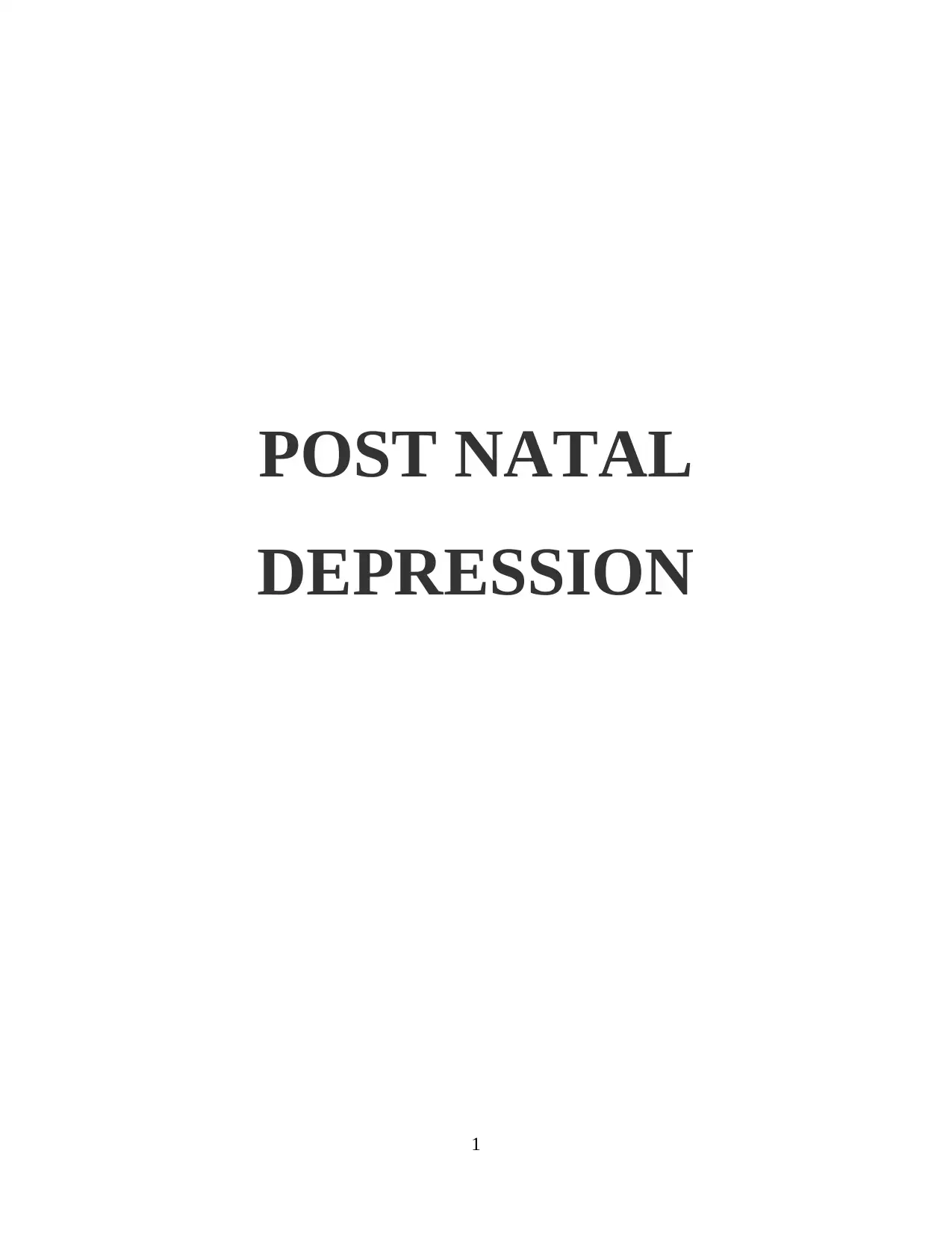
POST NATAL
DEPRESSION
1
DEPRESSION
1
Paraphrase This Document
Need a fresh take? Get an instant paraphrase of this document with our AI Paraphraser
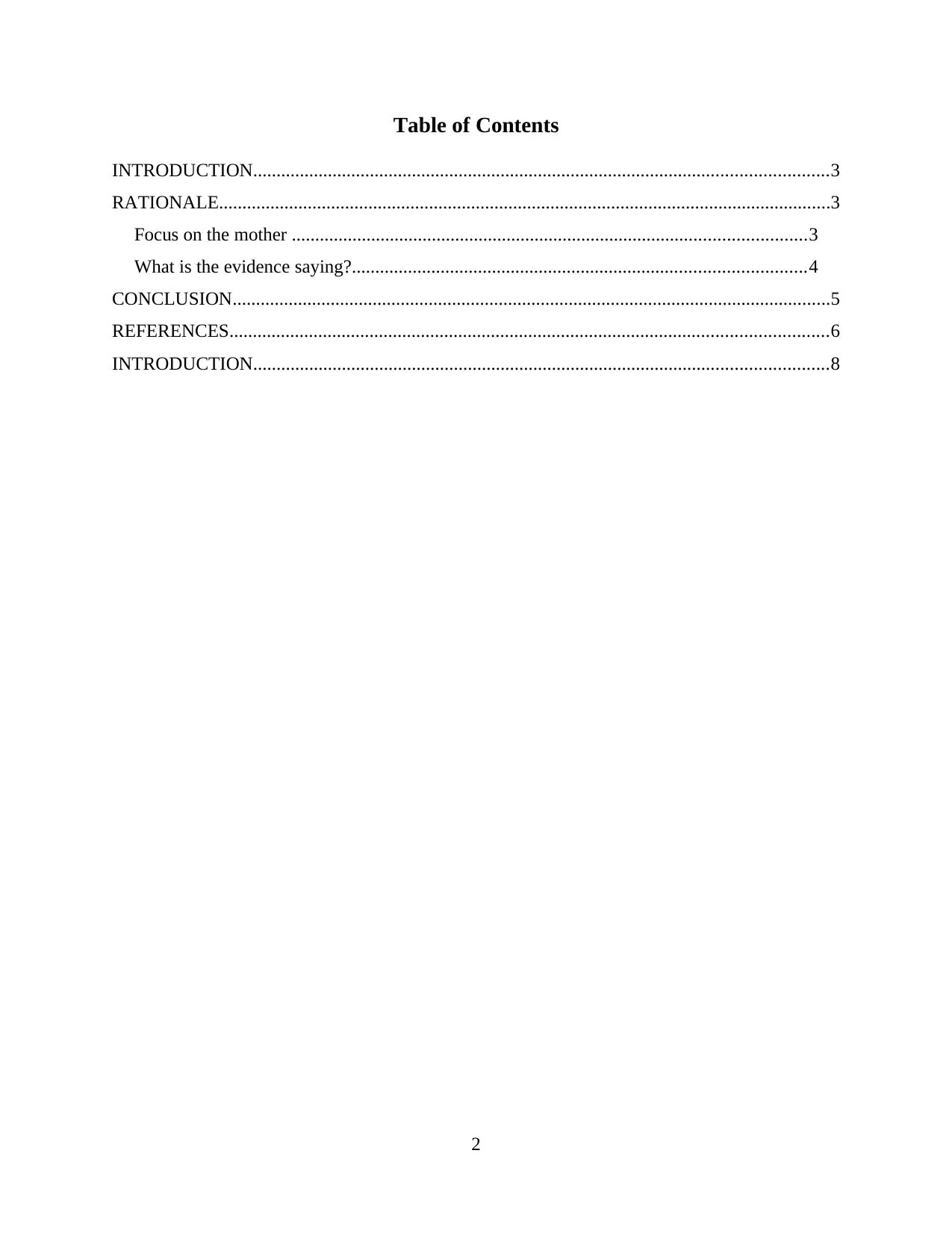
Table of Contents
INTRODUCTION...........................................................................................................................3
RATIONALE...................................................................................................................................3
Focus on the mother ..............................................................................................................3
What is the evidence saying?.................................................................................................4
CONCLUSION................................................................................................................................5
REFERENCES................................................................................................................................6
INTRODUCTION...........................................................................................................................8
2
INTRODUCTION...........................................................................................................................3
RATIONALE...................................................................................................................................3
Focus on the mother ..............................................................................................................3
What is the evidence saying?.................................................................................................4
CONCLUSION................................................................................................................................5
REFERENCES................................................................................................................................6
INTRODUCTION...........................................................................................................................8
2
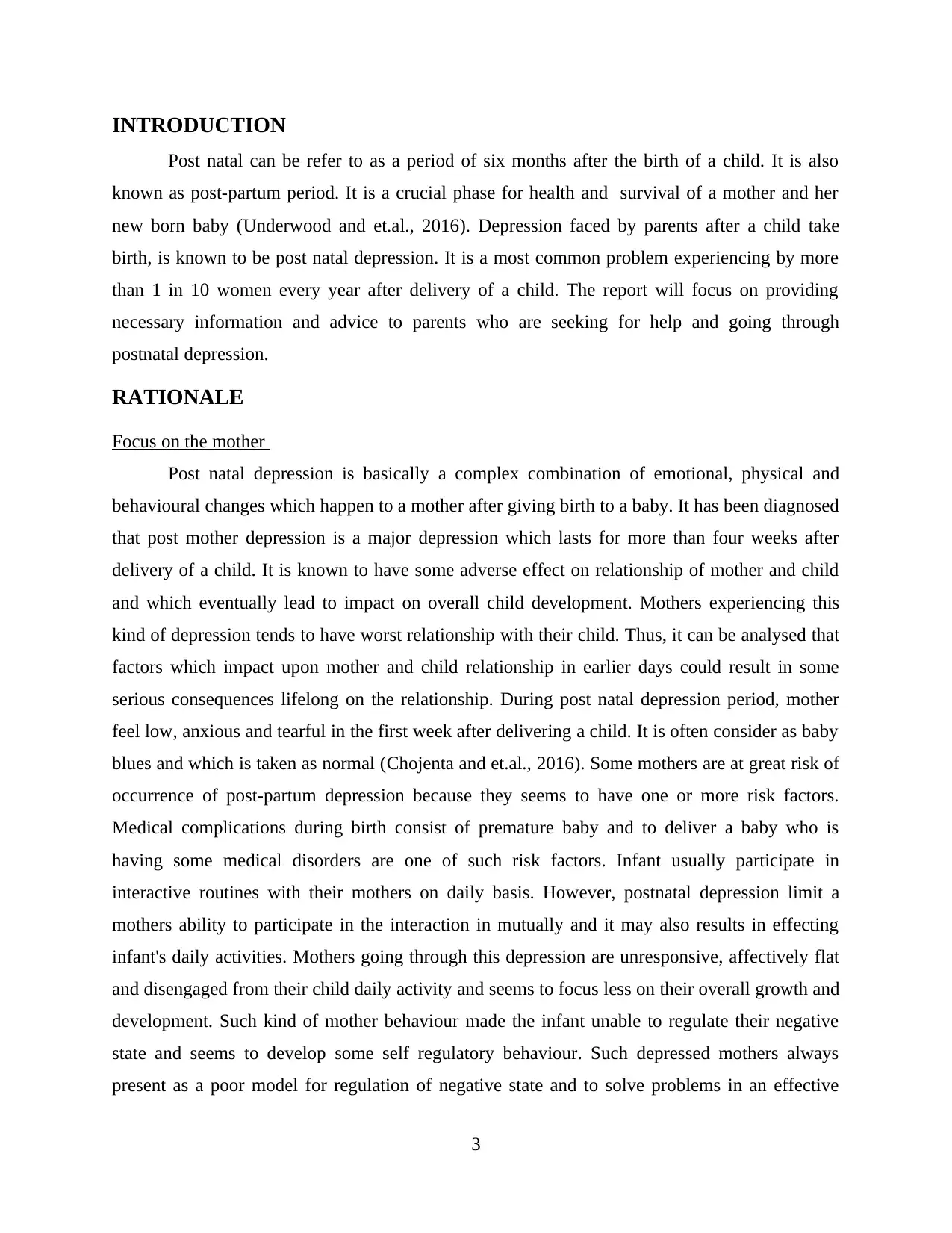
INTRODUCTION
Post natal can be refer to as a period of six months after the birth of a child. It is also
known as post-partum period. It is a crucial phase for health and survival of a mother and her
new born baby (Underwood and et.al., 2016). Depression faced by parents after a child take
birth, is known to be post natal depression. It is a most common problem experiencing by more
than 1 in 10 women every year after delivery of a child. The report will focus on providing
necessary information and advice to parents who are seeking for help and going through
postnatal depression.
RATIONALE
Focus on the mother
Post natal depression is basically a complex combination of emotional, physical and
behavioural changes which happen to a mother after giving birth to a baby. It has been diagnosed
that post mother depression is a major depression which lasts for more than four weeks after
delivery of a child. It is known to have some adverse effect on relationship of mother and child
and which eventually lead to impact on overall child development. Mothers experiencing this
kind of depression tends to have worst relationship with their child. Thus, it can be analysed that
factors which impact upon mother and child relationship in earlier days could result in some
serious consequences lifelong on the relationship. During post natal depression period, mother
feel low, anxious and tearful in the first week after delivering a child. It is often consider as baby
blues and which is taken as normal (Chojenta and et.al., 2016). Some mothers are at great risk of
occurrence of post-partum depression because they seems to have one or more risk factors.
Medical complications during birth consist of premature baby and to deliver a baby who is
having some medical disorders are one of such risk factors. Infant usually participate in
interactive routines with their mothers on daily basis. However, postnatal depression limit a
mothers ability to participate in the interaction in mutually and it may also results in effecting
infant's daily activities. Mothers going through this depression are unresponsive, affectively flat
and disengaged from their child daily activity and seems to focus less on their overall growth and
development. Such kind of mother behaviour made the infant unable to regulate their negative
state and seems to develop some self regulatory behaviour. Such depressed mothers always
present as a poor model for regulation of negative state and to solve problems in an effective
3
Post natal can be refer to as a period of six months after the birth of a child. It is also
known as post-partum period. It is a crucial phase for health and survival of a mother and her
new born baby (Underwood and et.al., 2016). Depression faced by parents after a child take
birth, is known to be post natal depression. It is a most common problem experiencing by more
than 1 in 10 women every year after delivery of a child. The report will focus on providing
necessary information and advice to parents who are seeking for help and going through
postnatal depression.
RATIONALE
Focus on the mother
Post natal depression is basically a complex combination of emotional, physical and
behavioural changes which happen to a mother after giving birth to a baby. It has been diagnosed
that post mother depression is a major depression which lasts for more than four weeks after
delivery of a child. It is known to have some adverse effect on relationship of mother and child
and which eventually lead to impact on overall child development. Mothers experiencing this
kind of depression tends to have worst relationship with their child. Thus, it can be analysed that
factors which impact upon mother and child relationship in earlier days could result in some
serious consequences lifelong on the relationship. During post natal depression period, mother
feel low, anxious and tearful in the first week after delivering a child. It is often consider as baby
blues and which is taken as normal (Chojenta and et.al., 2016). Some mothers are at great risk of
occurrence of post-partum depression because they seems to have one or more risk factors.
Medical complications during birth consist of premature baby and to deliver a baby who is
having some medical disorders are one of such risk factors. Infant usually participate in
interactive routines with their mothers on daily basis. However, postnatal depression limit a
mothers ability to participate in the interaction in mutually and it may also results in effecting
infant's daily activities. Mothers going through this depression are unresponsive, affectively flat
and disengaged from their child daily activity and seems to focus less on their overall growth and
development. Such kind of mother behaviour made the infant unable to regulate their negative
state and seems to develop some self regulatory behaviour. Such depressed mothers always
present as a poor model for regulation of negative state and to solve problems in an effective
3
⊘ This is a preview!⊘
Do you want full access?
Subscribe today to unlock all pages.

Trusted by 1+ million students worldwide
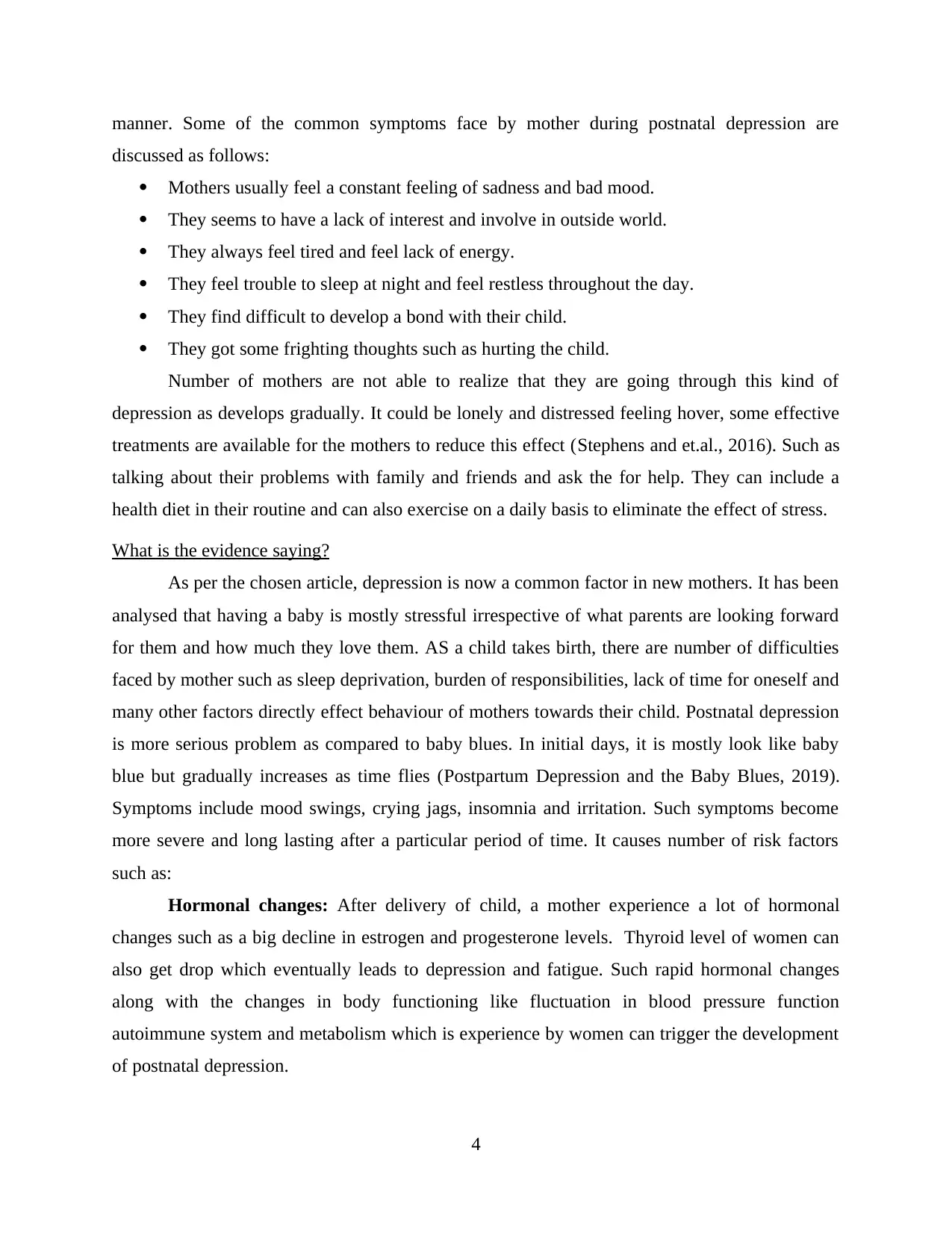
manner. Some of the common symptoms face by mother during postnatal depression are
discussed as follows:
Mothers usually feel a constant feeling of sadness and bad mood.
They seems to have a lack of interest and involve in outside world.
They always feel tired and feel lack of energy.
They feel trouble to sleep at night and feel restless throughout the day.
They find difficult to develop a bond with their child.
They got some frighting thoughts such as hurting the child.
Number of mothers are not able to realize that they are going through this kind of
depression as develops gradually. It could be lonely and distressed feeling hover, some effective
treatments are available for the mothers to reduce this effect (Stephens and et.al., 2016). Such as
talking about their problems with family and friends and ask the for help. They can include a
health diet in their routine and can also exercise on a daily basis to eliminate the effect of stress.
What is the evidence saying?
As per the chosen article, depression is now a common factor in new mothers. It has been
analysed that having a baby is mostly stressful irrespective of what parents are looking forward
for them and how much they love them. AS a child takes birth, there are number of difficulties
faced by mother such as sleep deprivation, burden of responsibilities, lack of time for oneself and
many other factors directly effect behaviour of mothers towards their child. Postnatal depression
is more serious problem as compared to baby blues. In initial days, it is mostly look like baby
blue but gradually increases as time flies (Postpartum Depression and the Baby Blues, 2019).
Symptoms include mood swings, crying jags, insomnia and irritation. Such symptoms become
more severe and long lasting after a particular period of time. It causes number of risk factors
such as:
Hormonal changes: After delivery of child, a mother experience a lot of hormonal
changes such as a big decline in estrogen and progesterone levels. Thyroid level of women can
also get drop which eventually leads to depression and fatigue. Such rapid hormonal changes
along with the changes in body functioning like fluctuation in blood pressure function
autoimmune system and metabolism which is experience by women can trigger the development
of postnatal depression.
4
discussed as follows:
Mothers usually feel a constant feeling of sadness and bad mood.
They seems to have a lack of interest and involve in outside world.
They always feel tired and feel lack of energy.
They feel trouble to sleep at night and feel restless throughout the day.
They find difficult to develop a bond with their child.
They got some frighting thoughts such as hurting the child.
Number of mothers are not able to realize that they are going through this kind of
depression as develops gradually. It could be lonely and distressed feeling hover, some effective
treatments are available for the mothers to reduce this effect (Stephens and et.al., 2016). Such as
talking about their problems with family and friends and ask the for help. They can include a
health diet in their routine and can also exercise on a daily basis to eliminate the effect of stress.
What is the evidence saying?
As per the chosen article, depression is now a common factor in new mothers. It has been
analysed that having a baby is mostly stressful irrespective of what parents are looking forward
for them and how much they love them. AS a child takes birth, there are number of difficulties
faced by mother such as sleep deprivation, burden of responsibilities, lack of time for oneself and
many other factors directly effect behaviour of mothers towards their child. Postnatal depression
is more serious problem as compared to baby blues. In initial days, it is mostly look like baby
blue but gradually increases as time flies (Postpartum Depression and the Baby Blues, 2019).
Symptoms include mood swings, crying jags, insomnia and irritation. Such symptoms become
more severe and long lasting after a particular period of time. It causes number of risk factors
such as:
Hormonal changes: After delivery of child, a mother experience a lot of hormonal
changes such as a big decline in estrogen and progesterone levels. Thyroid level of women can
also get drop which eventually leads to depression and fatigue. Such rapid hormonal changes
along with the changes in body functioning like fluctuation in blood pressure function
autoimmune system and metabolism which is experience by women can trigger the development
of postnatal depression.
4
Paraphrase This Document
Need a fresh take? Get an instant paraphrase of this document with our AI Paraphraser
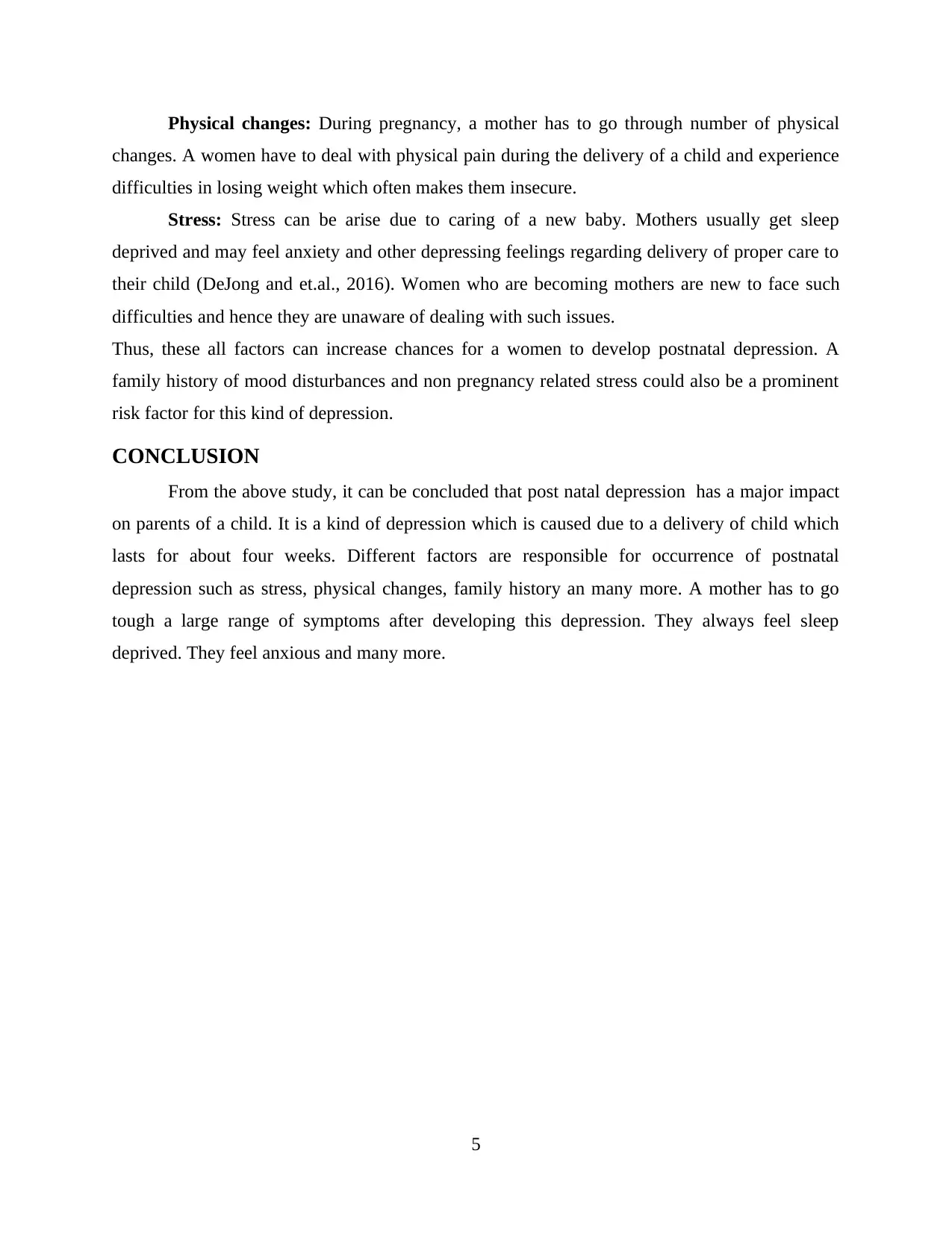
Physical changes: During pregnancy, a mother has to go through number of physical
changes. A women have to deal with physical pain during the delivery of a child and experience
difficulties in losing weight which often makes them insecure.
Stress: Stress can be arise due to caring of a new baby. Mothers usually get sleep
deprived and may feel anxiety and other depressing feelings regarding delivery of proper care to
their child (DeJong and et.al., 2016). Women who are becoming mothers are new to face such
difficulties and hence they are unaware of dealing with such issues.
Thus, these all factors can increase chances for a women to develop postnatal depression. A
family history of mood disturbances and non pregnancy related stress could also be a prominent
risk factor for this kind of depression.
CONCLUSION
From the above study, it can be concluded that post natal depression has a major impact
on parents of a child. It is a kind of depression which is caused due to a delivery of child which
lasts for about four weeks. Different factors are responsible for occurrence of postnatal
depression such as stress, physical changes, family history an many more. A mother has to go
tough a large range of symptoms after developing this depression. They always feel sleep
deprived. They feel anxious and many more.
5
changes. A women have to deal with physical pain during the delivery of a child and experience
difficulties in losing weight which often makes them insecure.
Stress: Stress can be arise due to caring of a new baby. Mothers usually get sleep
deprived and may feel anxiety and other depressing feelings regarding delivery of proper care to
their child (DeJong and et.al., 2016). Women who are becoming mothers are new to face such
difficulties and hence they are unaware of dealing with such issues.
Thus, these all factors can increase chances for a women to develop postnatal depression. A
family history of mood disturbances and non pregnancy related stress could also be a prominent
risk factor for this kind of depression.
CONCLUSION
From the above study, it can be concluded that post natal depression has a major impact
on parents of a child. It is a kind of depression which is caused due to a delivery of child which
lasts for about four weeks. Different factors are responsible for occurrence of postnatal
depression such as stress, physical changes, family history an many more. A mother has to go
tough a large range of symptoms after developing this depression. They always feel sleep
deprived. They feel anxious and many more.
5
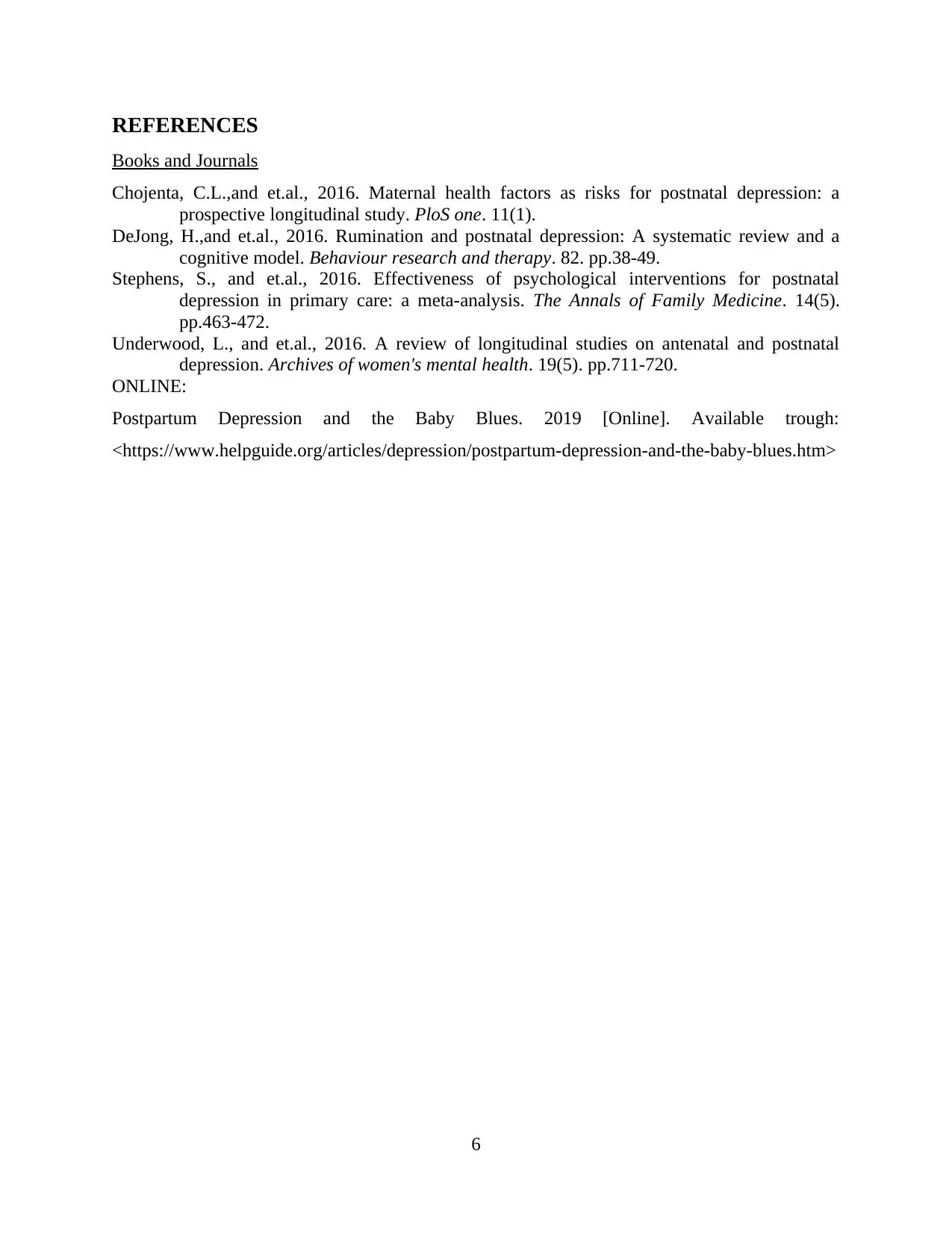
REFERENCES
Books and Journals
Chojenta, C.L.,and et.al., 2016. Maternal health factors as risks for postnatal depression: a
prospective longitudinal study. PloS one. 11(1).
DeJong, H.,and et.al., 2016. Rumination and postnatal depression: A systematic review and a
cognitive model. Behaviour research and therapy. 82. pp.38-49.
Stephens, S., and et.al., 2016. Effectiveness of psychological interventions for postnatal
depression in primary care: a meta-analysis. The Annals of Family Medicine. 14(5).
pp.463-472.
Underwood, L., and et.al., 2016. A review of longitudinal studies on antenatal and postnatal
depression. Archives of women's mental health. 19(5). pp.711-720.
ONLINE:
Postpartum Depression and the Baby Blues. 2019 [Online]. Available trough:
<https://www.helpguide.org/articles/depression/postpartum-depression-and-the-baby-blues.htm>
6
Books and Journals
Chojenta, C.L.,and et.al., 2016. Maternal health factors as risks for postnatal depression: a
prospective longitudinal study. PloS one. 11(1).
DeJong, H.,and et.al., 2016. Rumination and postnatal depression: A systematic review and a
cognitive model. Behaviour research and therapy. 82. pp.38-49.
Stephens, S., and et.al., 2016. Effectiveness of psychological interventions for postnatal
depression in primary care: a meta-analysis. The Annals of Family Medicine. 14(5).
pp.463-472.
Underwood, L., and et.al., 2016. A review of longitudinal studies on antenatal and postnatal
depression. Archives of women's mental health. 19(5). pp.711-720.
ONLINE:
Postpartum Depression and the Baby Blues. 2019 [Online]. Available trough:
<https://www.helpguide.org/articles/depression/postpartum-depression-and-the-baby-blues.htm>
6
⊘ This is a preview!⊘
Do you want full access?
Subscribe today to unlock all pages.

Trusted by 1+ million students worldwide

7
Paraphrase This Document
Need a fresh take? Get an instant paraphrase of this document with our AI Paraphraser
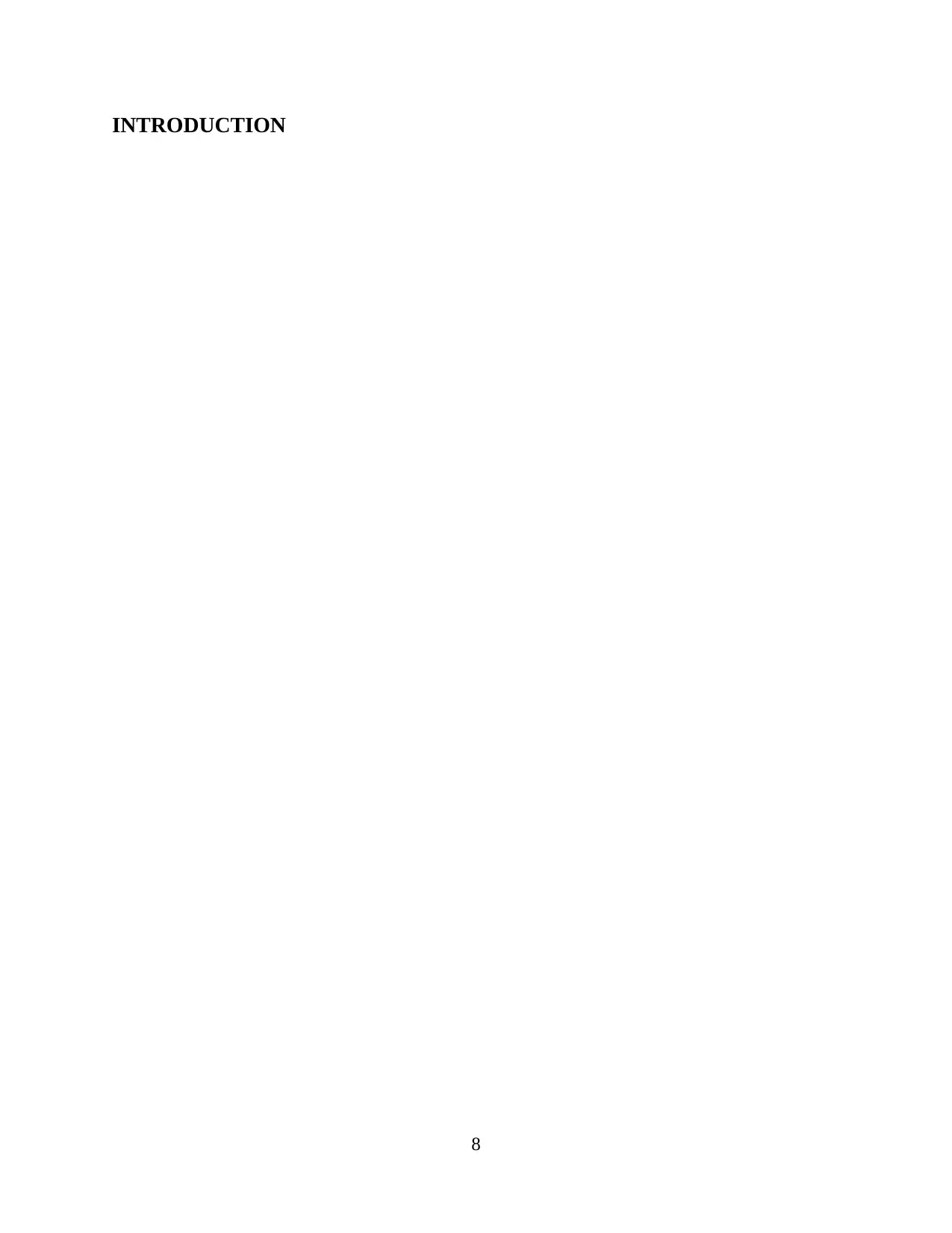
INTRODUCTION
8
8

9
⊘ This is a preview!⊘
Do you want full access?
Subscribe today to unlock all pages.

Trusted by 1+ million students worldwide
1 out of 9
Related Documents
Your All-in-One AI-Powered Toolkit for Academic Success.
+13062052269
info@desklib.com
Available 24*7 on WhatsApp / Email
![[object Object]](/_next/static/media/star-bottom.7253800d.svg)
Unlock your academic potential
Copyright © 2020–2026 A2Z Services. All Rights Reserved. Developed and managed by ZUCOL.




